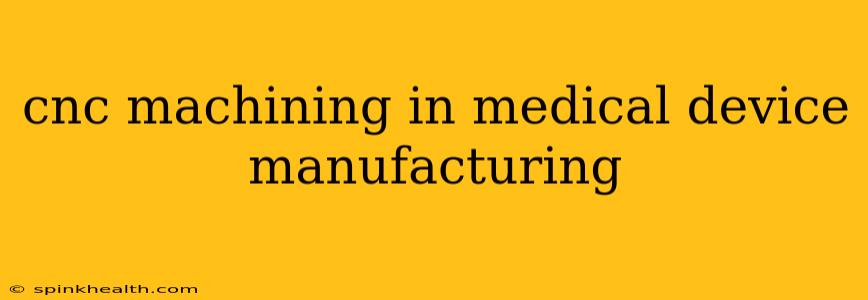The whirring of CNC machines, the precise dance of cutting tools, the gleaming finish of a newly machined component – this isn't just a scene from a factory floor; it's the heartbeat of medical device manufacturing. CNC machining plays a pivotal role, providing the accuracy, efficiency, and repeatability essential for creating life-saving and life-improving devices. But it's more than just precision; it's about crafting components with unparalleled quality, safety, and reliability. Let's delve into the critical role CNC machining plays in this crucial industry.
What is CNC Machining and How Does it Work in Medical Device Manufacturing?
Imagine a surgeon needing a perfectly sized implant, a technician requiring a flawlessly smooth component for a dialysis machine, or a researcher demanding intricate parts for a groundbreaking medical instrument. This is where Computer Numerical Control (CNC) machining steps in. It's a subtractive manufacturing process where pre-programmed instructions guide cutting tools to precisely remove material from a workpiece, shaping it into the desired form. This process utilizes sophisticated software and machinery to achieve unparalleled accuracy and repeatability, making it ideal for the stringent requirements of the medical device industry. CNC machines can handle various materials, including titanium, stainless steel, polymers, and ceramics—all vital in creating diverse medical devices.
What are the Benefits of Using CNC Machining for Medical Devices?
The advantages of CNC machining in medical device manufacturing are multifaceted and substantial:
- Unmatched Precision and Accuracy: CNC machining delivers tolerances down to microns, crucial for components that need to fit precisely and function flawlessly within the human body.
- High Repeatability: The pre-programmed nature of CNC ensures consistent quality across large production runs, minimizing variations and maximizing reliability.
- Complex Geometry Capabilities: CNC machines can create incredibly intricate designs, essential for the increasingly sophisticated nature of modern medical devices.
- Material Versatility: The ability to machine various materials allows for the creation of devices with diverse properties and functionalities, adapting to specific medical needs.
- Reduced Lead Times: Efficient automated processes minimize production time, enabling faster delivery of medical devices to the market.
What Materials are Commonly Used in CNC Machining for Medical Devices?
The choice of material is critical in medical device manufacturing, impacting biocompatibility, durability, and performance. Here are some common materials and why they're chosen:
- Stainless Steel: Known for its strength, corrosion resistance, and biocompatibility, stainless steel is widely used in surgical instruments, implants, and other devices requiring high durability.
- Titanium: A lightweight yet incredibly strong material, titanium exhibits excellent biocompatibility and is often used in implants due to its resistance to corrosion and biodegradation.
- Plastics (e.g., PEEK, ULTEM): Polymers like PEEK and ULTEM offer excellent biocompatibility, strength, and sterilizability, making them suitable for various medical device components.
- Ceramics (e.g., Alumina, Zirconia): Ceramics provide high strength, wear resistance, and biocompatibility, finding applications in dental implants and bone replacements.
What are the Common Applications of CNC Machining in Medical Device Manufacturing?
CNC machining's versatility shines through in its numerous applications within the medical device industry:
- Orthopedic Implants: Hip replacements, knee replacements, and other orthopedic implants often leverage CNC machining for precision and accuracy.
- Surgical Instruments: Scalpels, forceps, and other surgical tools benefit from the precision and durability offered by CNC machining.
- Dental Implants: The intricate designs required for dental implants are often achieved using CNC machining techniques.
- Implantable Medical Devices: Pacemakers, drug delivery devices, and other implantable components require the high degree of precision and biocompatibility that CNC machining provides.
How Does CNC Machining Ensure the Safety and Sterility of Medical Devices?
Safety and sterility are paramount in medical device manufacturing. CNC machining contributes to this in several ways:
- Precise Tolerances: Minimizes potential for device malfunction or failure due to dimensional inaccuracies.
- Smooth Surface Finishes: Reduces the risk of bacterial adhesion and improves biocompatibility.
- Clean Manufacturing Processes: Modern CNC machines are designed to minimize debris and contamination during the machining process.
- Material Selection: The choice of biocompatible materials further enhances the safety and sterility of medical devices.
CNC machining stands as a critical technology driving innovation in medical device manufacturing, allowing for the creation of safer, more effective, and more reliable devices that improve and save lives. Its capacity to combine precision, speed, and versatility positions it as an indispensable part of the future of healthcare.

